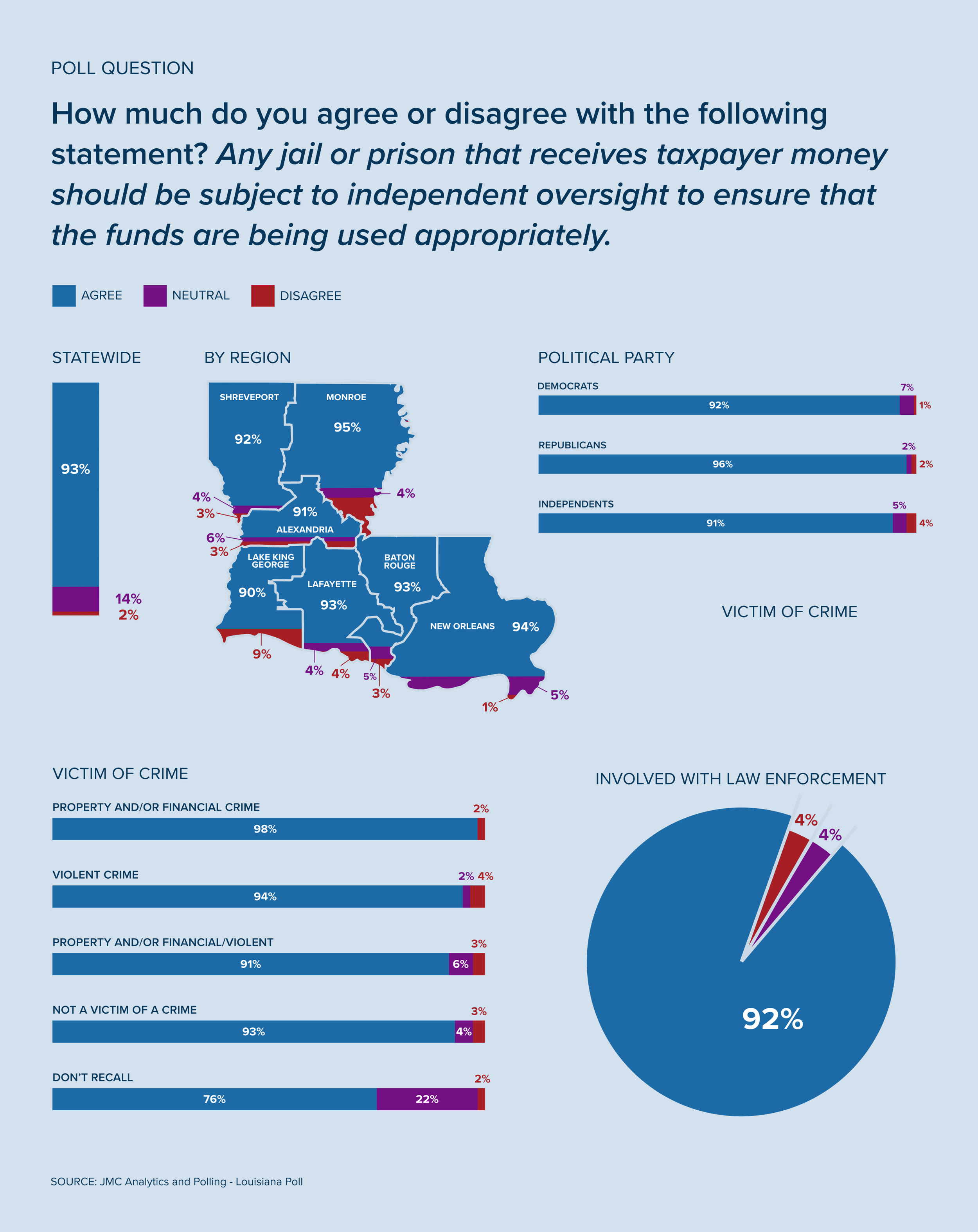Louisiana
“This polling shows that Louisianans are concerned about crime but won’t be satisfied with ineffective crackdowns and kneejerk policymaking. No matter their political views, voters want evidence-based solutions focused on what works to keep communities safe and reduce recidivism.”
An April 2023 poll of more than 600 Louisianans found that 70% of Pelican State respondents favored rehabilitation over longer sentences for people convicted of non-violent offenses. By comparison, only about a quarter of people — 26% — wanted to see people spend longer sentences behind bars.
Majority support for rehabilitation was found among both political parties and among both households in which a person is involved with law enforcement, and where a person has been the victim of crime. 73% of Democrats, 63% of Republicans, 76% of crime victim households, and 66% of law enforcement households all said it’s most important that a person exit jail less likely to reoffend, than having served a long sentence while there. More from the poll.
What's Most Important for Non-Violent Offenses?
No Answer: 4%
Longer Sentences: 26%
Less likely to reoffend: 70%
Which of the following statements comes closest to your point of view about people convicted of nonviolent offenses?
… It does not matter whether a people convicted of a nonviolent crime
serves a longer sentence. What matters most is that when they complete their time, they are less likely to reoffend.
… Longer sentences for nonviolent crimes have made us safer
and we should not reduce prison sentences for anyone. As long
as these criminals are behind bars, they cannot reoffend.
… Left blank
Recent Legislation
2023
SB 111: Eliminates a $500 fee for filing for record clearance; requires the state to expunge a record once a person submits a simple form; and makes upgrades to the state's data systems, among other changes.
2022
HB 639: Establishes pre-clearance for people seeking occupational licensing.
2021
House Bill 560: Creates a presumption of citation in lieu of arrest for misdemeanors and felony theft.
House Bill 248: Eliminates inactive parole fees.
2018
House Bill 558: Requires correctional facilities to provide certain healthcare products for incarcerated women; prohibits male correctional facility employees from conducting pat-downs or searches on women unless certain circumstances are present.
2017
House Bill 116: Streamlines registration for victim notification and allows victims to request certain measures for their individual safety as a condition of a person’s release.
House Bill 249: Directs courts to waive financial obligations or create a single payment plan with monthly payments of one day’s pay for those facing financial hardship; incentivizes consistent payments with a debt forgiveness reward; restricts the use of incarceration and driver’s license suspension as penalties only for cases involving willful failure to pay as opposed to inability to pay; limits the extension of a person’s probation supervision term to a single six-month extension.
House Bill 489: Directs the DOC in conjunction with the Louisiana Commission on Law Enforcement to collect data on the outcomes of the Justice Reinvestment reform package and report it annually; requires savings to be reinvested into certain programs.
House Bill 519: Streamlines the process by which individuals with criminal convictions can apply for and receive occupational licenses.
House Bill 680: Suspends child support payments for people who have been incarcerated for more than six months unless the person has the means to pay or is imprisoned for specified offenses; allows courts to extend child support payments beyond the termination date.
House Bill 681: Lifts Louisiana’s ban on SNAP benefits (Supplemental Nutrition Assistance Program) and TANF benefits (Temporary Assistance for Needy Families) for individuals with drug convictions.
Senate Bill 16: Ensures that most individuals sentenced to life as juveniles receive an opportunity for parole consideration after serving a minimum of 25 years in prison.
Senate Bill 139: Expands eligibility for the substance abuse probation program and drug courts; expands eligibility for alternatives to incarceration and early release; streamlines parole release process for people convicted of nonviolent offenses; implements incentives in custody and on supervision to encourage positive behavior; implements evidence-based practices for probation and parole supervision.
Senate Bill 220: Restructures drug offenses sentencing by weight of the drugs involved; raises felony theft threshold to $1,000; removes less serious crimes from the violent crimes list; modifies penalties for certain nonviolent offenses; creates the Louisiana Felony Class System Task Force.
Senate Bill 221: Lowers mandatory minimum sentences for second and third offenses under habitual offender statute; differentiates cleansing periods based upon whether prior offense was violent or nonviolent; allows judges to impose sentences outside the provisions of the habitual offender statute if he or she determines the required sentence constitutionally excessive.
2016
House Bill 7: Allows individuals to have records expunged in cases of factual innocence; expands expungement eligibility to those who have committed certain crimes of violence after a 10-year cleansing period.
House Bill 145: Provides for the issuance of a certificate of employability by a reentry division of court under certain circumstances.
House Bill 146: Provides a limitation of liability for certain persons mentoring a person on probation.
House Bill 266: Prohibits certain questions regarding criminal history during the employment process for certain state positions.
House Bill 347 and House Bill 548: Authorizes the creation of additional re-entry courts in certain districts.
House Bill 1022: Provides conditions and procedures for suspending an individual’s sentence upon completion of the Offender Rehabilitation and Workforce Development Program.
House Bill 1052: Creates the Swift and Certain Probation Pilot Program.



